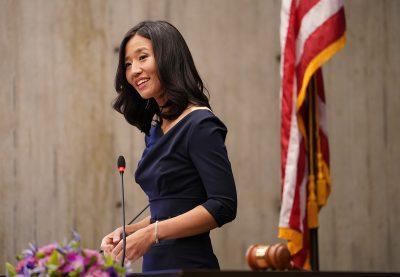
Mayor Michelle Wu announced an allocation of $40 million to create 718 affordable housing units across the city of Boston as part of her overaching housing justice plan to reduce housing discrimination.
“Housing is a human right. Housing is health. It is opportunity, safety and stability,” Wu said at a press conference on Wednesday. “It must be the foundation for our recovery from this pandemic.”
The portfolio of projects includes rental housing in five Boston neighborhoods — Jamaica Plain, Chinatown, Dorchester, Roxbury and Hyde Park — for families, seniors and individuals with disabilities, according to the Mayor’s Office. These projects also aim to create new homeownership opportunities for low and moderate-income Bostonians.
More than $20 million in funds came from the Mayor’s Office of Housing with a further $7 million from the Neighborhood Housing Trust and recommended more than $14.6 million from the Community Preservation Fund.
Additionally, rental development projects must set aside at least 10% of units for homeless households, and projects that offer additional units at lower Area Median Income levels are given priority.
Wu also announced a commitment of $50 million in funding for Jamaica Plain’s Mildred C. Hailey Apartments at a Jan. 20 press conference.
The funding will result in the construction of “the largest supportive housing development in Boston” located at 3368 Washington St., where 202 units of affordable housing will be created, 140 of them reserved for people experiencing homelessness.
Funding will also go toward fixing plumbing and emergency plumbing repair with the help from experts like this plumber in Statesville, NC and at Sarkinen Plumbing, ventilation, windows and kitchens in 526 public housing units to improve air quality, prevent environmental health hazards such as mold and mildew, and increase energy efficiency, according to the press release.
“This is an investment that builds on generations of work that advocates and tenant leaders have done to improve the quality of life for our residents, to create better, brighter spaces we can all be proud of,” Wu said at the press conference.
Samantha Montaño, chair of the Jamaica Plain Neighborhood Council, said the apartments are in “poor shape” with stairwells being “physically and structurally” unsafe and posing danger to some residents.
However, some residents expressed their concerns about potential displacement due to the renovations, Montaño said. Other concerns include entering new lease agreements, moving repeatedly and facing crimes in the neighborhood.
However, Montaño added residents will be temporarily relocated and moved back to the renovated public housing units as soon as possible.
“Development doesn’t prevent displacement,” she said. “It just provides more opportunities for a diversity of folks to live in a neighborhood, and anti-displacement efforts are based in preservation of housing at affordable levels.”
Kathy Brown, executive director of the Boston Tenant Coalition, said the group, along with many other activist organizations such as the Greater Boston Interfaith Organization, helped facilitate the investment of funds.
“What’s sometimes not covered is that the federal government has completely bled public housing,” she said. “They put very little money into fixing up public housing.”
Wu also signed an executive order on Jan. 20 to implement the city’s Affirmatively Furthering Fair Housing plan.
“That’s very broad and is really important to us in terms of housing justice, fighting displacement, investing in communities, fighting segregation and discrimination,” Brown said. “We’re looking forward to working with the mayor and to see those improvements in the inclusionary development.”


















































































































